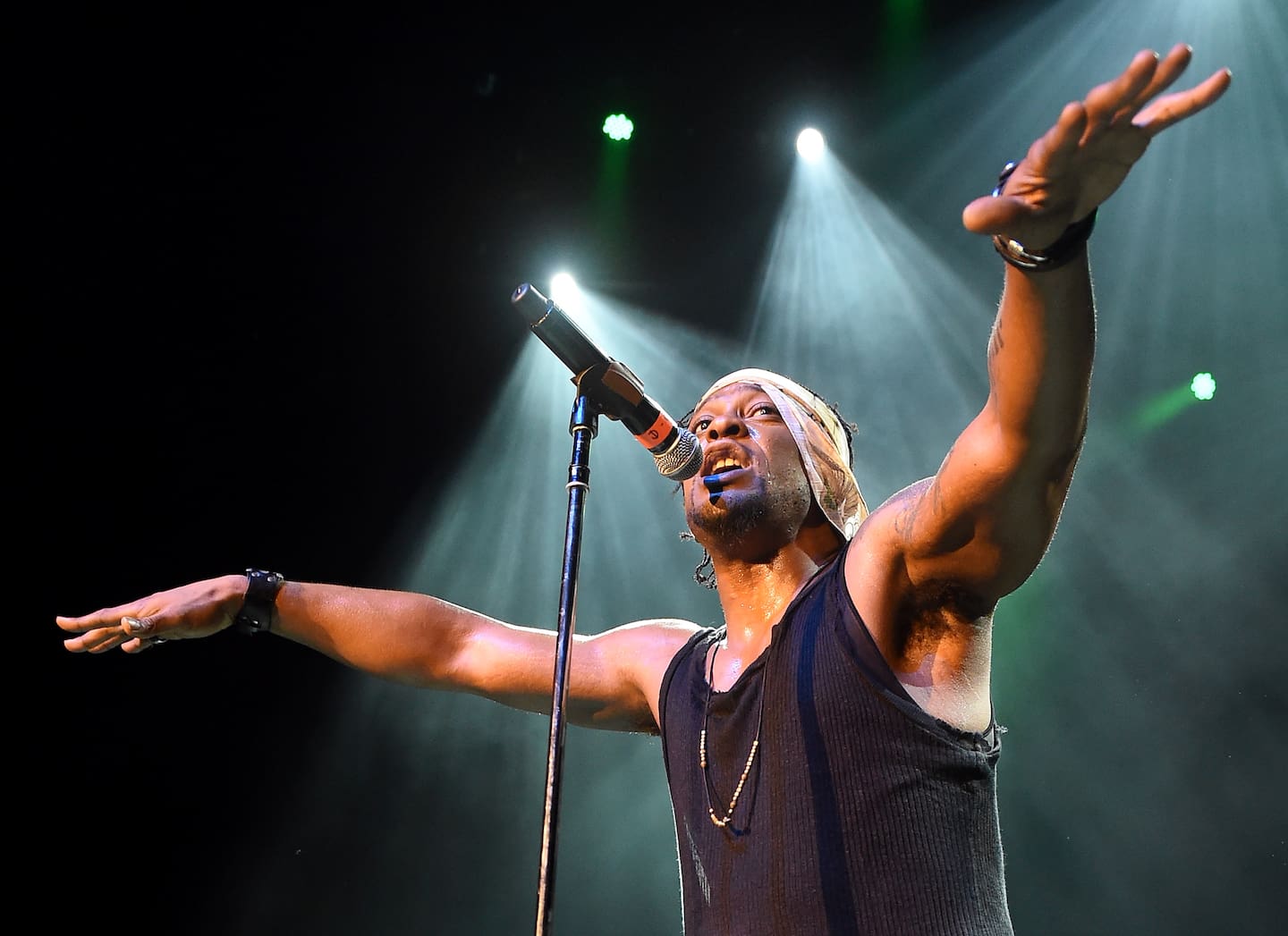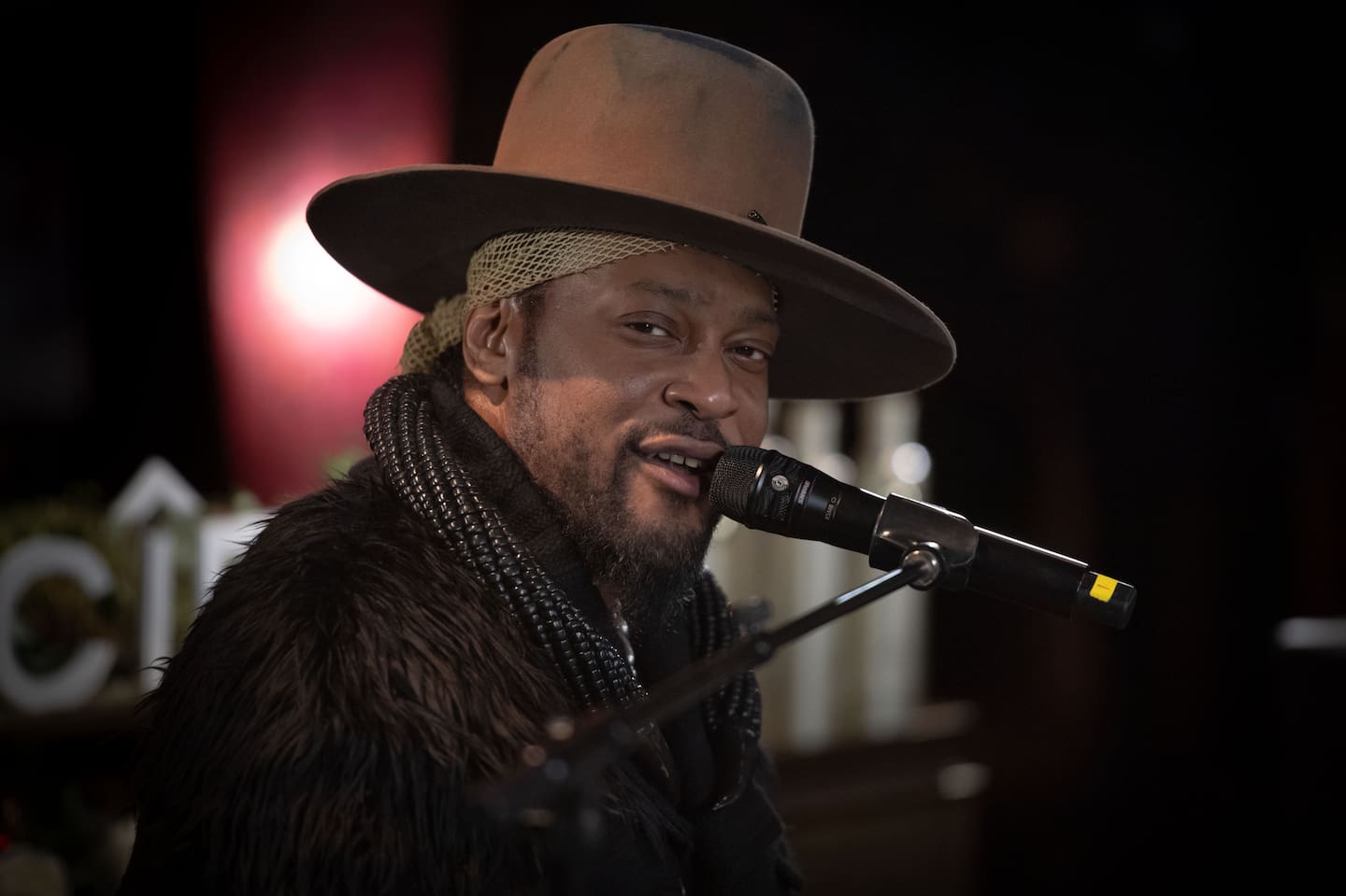
DâAngelo, the visionary singer and musician who blended R&B and soul in landmark albums such as Brown Sugar and Voodoo, mesmerising critics and audiences even as he disappeared from public view for years at a time, died on October 14. He was 51.
His family announced the death in a statement, saying he had âa prolonged and courageous battle with cancerâ. They did not say where he died.
Beginning with his debut album, 1995âs Brown Sugar, DâAngelo helped pave the way for a new era in R&B, nodding to an old-school soul sound while incorporating notes of funk, hip-hop and jazz. Alongside musicians such as Erykah Badu, Lauryn Hill, Maxwell and Jill Scott, he became a defining artist of neo-soul, a genre that was named by his own manager, Kedar Massenburg.
Despite releasing only three studio albums, DâAngelo was hailed as one of the greatest R&B singers and musical talents of his generation. A versatile musician who could toggle between guitar, drums and keyboards, he sang in a sultry, breathy style that could burst into euphoric heights.
He drew early comparisons to Donny Hathaway, Marvin Gaye, Sly Stone and Prince, who also displayed a musical obsessiveness and played multiple instruments on his albums.
âDâAngelo bears no resemblance to the dozens of sound-alike crooners who populate âQuiet Stormâ radio formats; his falsetto yelps, note-bending purrs and stop-and-go phrasing mark him as a one-of-a-kind singer,â Washington Post music critic Geoffrey Himes wrote in 1995.
With the success of Brown Sugar, other musicians came into the singerâs fold. The drummer and producer Questlove, who became a collaborator, told Vice in 2014 that before hearing DâAngelo, âI had lost faith in modern R&Bâ.
âNot since Prince had any black singer floored me musically the way DâAngelo did,â he added. âThere were plenty of great singers, but their music was mundane. From his keyboard patches to his sloppy, human-like drum programming, I felt like I had a kindred spirit.â
DâAngelo spent years working on his sophomore album, 2000âs Voodoo, an eclectic record that was influenced by the birth of his first child; the sounds of gospel, Latin, blues and hip-hop; and bootlegs of James Brown and Sly and the Family Stone. The album was born out of thousands of hours of musical experimentation at Electric Lady Studios in New York, where the singer collaborated with a free-flowing collective â the Soulquarians â that included Questlove, Badu, Q-Tip and J Dilla.

DâAngelo was born Michael Eugene Archer in Richmond, Virginia, in 1974. Photo / Getty Images
âIt is an album of loose, long, dirty grooves, finger snaps, falsetto serenades, gruff mumbles and bottom-dwelling bass,â the music journalist Toure wrote in Rolling Stone. âIt is soul music for the age of hip-hop.â
Voodoo topped the Billboard album chart and earned DâAngelo two Grammy Awards. It also turned the singer into a reluctant sex symbol: the music video for one of the recordâs standout tracks, the sultryâUntitled (How Does It Feel), featured a shirtless, muscular DâAngelo singing into the camera, and was heavily featured on MTV.
âSometimes, you know, I feel uncomfortable,â he told Toure in 2000. âTo be onstage and tryinâ to do your music and people goinâ, âTake it off! Take it off!â Cause Iâm not no stripper. Iâm up there doinâ somethinâ I strongly believe in.â
After the albumâs release, DâAngelo receded from public view for more than a decade. He was arrested for cocaine and marijuana possession, as well as for disorderly conduct, and later spoke candidly about his struggles with addiction and rehabilitation stints. A mug shot during that time became tabloid fodder for his stark physical transformation from his âUntitledâ days.
But he found his way back to music. After years of silence, racial justice protests and high-profile killings of black men by police pushed him to release Black Messiah in 2014. The album featured some of his most politically explicit material â âAll we wanted was a chance to talk,â he sang. ââStead we only got outlined in chalkâ â and earned him two more Grammy Awards.
âInstead of feeling heavy with expectation, it feels weightless in its delivery, sophisticated in its detail and urgent in its fury,â wrote Post music critic Chris Richards. It was apparent, he added, that DâAngelo had âlabored over these songs, but he makes herculean agony feel so effortless â and not even in a show-offy, Prince kind of way. At its best, his music sounds more like an act of nature than an exercise of human creativity.â
DâAngelo directly referenced his years away and grappled with his public image. âSo, if youâre wondering, what about the shape Iâm in,â he sang, âI hope it ainât my abdomen that youâre referring to.â
âWhen I wrote it, I envisioned it being the first thing people would hear, because it kind of tells the story of where Iâve been,â he told Rolling Stone of the lyric. âIt was kind of like me answering some questions, without really being asked. Not just for everybody, but also for myself.â
The youngest of three sons, he was born Michael Eugene Archer in Richmond on February 11, 1974. His father and grandfather were Pentecostal preachers. His mother was a legal secretary, and his parents divorced when he was 5.
DâAngelo, who adopted his stage name as a teenager, played the organ and helped lead the church choir as a child. It was there, he said, that he first felt the powerful hold music could have over others.
âI learned at an early age that what we were doing in the choir was just as important as the preacher. It was a ministry in itself,â he told GQ in 2012. âWe could stir the pot, you know? The stage is our pulpit, and you can use all of that energy and that music and the lights and the colours and the sound.â
While church members warned him against secular music, DâAngeloâs grandmother encouraged him to experiment. He found additional inspiration from his uncleâs record collection, which had everything from Gaye to Mahalia Jackson to Miles Davis to Otis Redding.
While in high school, he formed the band Michael Archer and Precise, performing soul covers and a smattering of originals at talent shows around Virginia. He briefly made beats and rapped for a hip-hop group, I.D.U. (Intelligent, Deadly But Unique), which led to a solo record deal with EMI.
In 1994, he began to gain notice within the industry for co-writing and co-producing U Will Know, an anti-violence track recorded by the R&B supergroup Black Men United. Heâd end up recording Brown Sugar in his motherâs Richmond home and, after its release, went on to collaborate with neo-soul musicians such as Hill, singing on her 1998 love song Nothing Even Matters.

After years out of view, DâAngelo returned with Black Messiah and two more Grammys. Photo / Getty Images
In recent years, rumours swirled about a potential new DâAngelo album. He made rare appearances, including on the online concert series Verzuz in 2021; in May, he announced that he was cancelling a scheduled performance at the annual Roots Picnic in Philadelphia because of complications from surgery. Singer and musician Raphael Saadiq, a frequent collaborator, said in a Rolling Stone podcast interview last year that the pair were working on songs for a new album.
DâAngelo had three children, including a son from a relationship with singer-songwriter Angie Stone, who worked on his Brown Sugar album. Stone died in a car crash in March. Complete information on survivors was not immediately available.
Like other groundbreaking musicians before him, DâAngelo bristled at being put into boxes. During a 2014 lecture at the Red Ball Music Academy festival in Brooklyn, he expressed frustration with rigid genre labels, including âneo-soulâ. Staring out, he recalled, âI used to always say, âI do black music. I make black music.ââ
Take your Radio, Podcasts and Music with you
Get the iHeart App
Get more of the radio, music and podcasts you love with the FREE iHeartRadio app. Scan the QR code to download now.
Download from the app stores
Stream unlimited music, thousands of radio stations and podcasts all in one app. iHeartRadio is easy to use and all FREE









